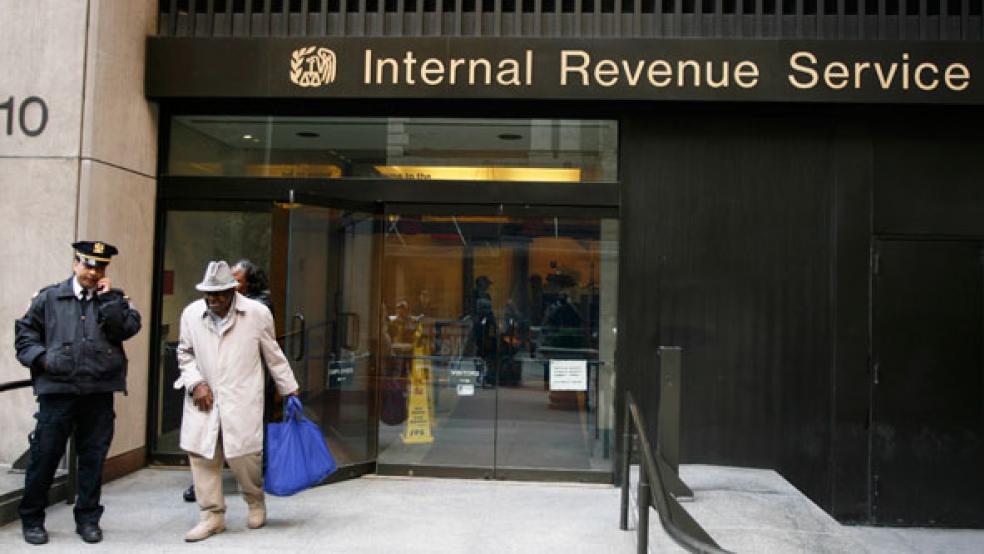Now that the open enrollment period has come to a close, the next challenge for Obamacare lies with the cash-strapped Internal Revenue Service, which is tasked with enforcing a handful of new provisions under the president’s healthcare law—including issuing penalties to Americans without health insurance.
The agency is also responsible for verifying the subsidy eligibility of more than 83 percent of the 7 million people who have signed up for insurance through the health exchanges.
Given the new burden, many are wondering if the agency can handle the additional load especially since the agency has had little success in closing the country’s $385 billion tax gap (last measured in 2006). That gap includes non-payments, underpayments and downright fraud.
Related: Why the Cash-Strapped IRS Isn’t Ready for Obamacare
Though IRS administrator John Koskinen says his agency is ready for Obamacare, he repeated his calls for more IRS funding in order to efficiently carry out the law.
“The biggest challenge to us is funding,” Koskinen said in a speech at the National Press Club on Wednesday. “We have fewer employees and resources, even as our responsibilities expand.”
In 1998, Congress passed the IRS Restructuring and Reform Act. One of the goals of that act was to achieve 80 percent electronic filing for both individual and business tax returns. That goal was achieved in 2012, which likely prompted additional budget cuts.
The report stated, “Electronic filing also substantially reduces IRS submission processing costs, resulting in productivity savings that are typically reinvested into other IRS programs that provide additional services to taxpayers.”

Under the new health law, the IRS is responsible for enforcing 45 new provisions including issuing penalties to Americans who are without health coverage after the open enrollment deadline, which ended on March 31. In addition, the agency is charged with verifying whether people who were approved for subsidies actually qualify and then helping to distribute those billions of subsidy dollars to people who purchased coverage on the state and federal exchanges, among other things.
Administering the subsidies will be a heavy lift for an agency that claims to already be overburdened and under-budgeted. “Since we are mandated to implement ACA, that means our budget level for other major projects like updating our IT systems has been shelved,” Koskinen said.
Related: Scandal-Scarred IRS Blew $50 Million on Meetings
The IRS chief’s request for more funding comes on the heels of a report from the agency’s inspector general, which shows the IRS is already experiencing challenges enforcing the law.
“The ACA contains an extensive array of tax law challenges that will present continuing source of challenges for the IRS in the coming years,” the auditor said. The auditor also made clear that the IRS has more work to do before it can effectively enforce the new provisions, including developing a more effective plan to determine whether tax-exempt hospitals are in compliance with the ACA.
“The IRS has made progress establishing controls to assess tax exempt hospital organization compliance, however additional work will be required once legal guidance is published,” the auditor said. “Until guidance is published the public cannot be assured that the IRS has implemented controls to ensure compliance with ACA provisions designed to protect those served by tax-exempt hospitals.”
Koskinen blamed the “lack of funding” for “significantly straining their ability” to enforce provisions under the new law. “The IRS is basically the only major agency running on post-sequester level funding.”
The agency’s budget was cut for the fourth year in a row in the $1.1 trillion omnibus spending bill approved by Congress and signed by President Obama. The agency was allocated $11.2 billion –down from $12 billion for the 2013 fiscal year--a significant decline from the IRS’s request Koskinen said the agency needs in order to collect tax revenue, prevent fraud and implement Obamacare.
He added that the number one complaint he hears from IRS workers across the country, is the concern that they don’t have enough employees to help provide services to taxpayers.
Still, some lawmakers are skeptical that the agency should get more funding. They point out that the IRS, which frequently says it is underfunded, held expensive employee retreats and doled out employee bonuses while the agency was the center of a scandal for allegedly targeting certain GOP tax-exempt groups.
“What I find unacceptable is that in this $11.3 billion appropriation that the IRS received this year, that you can't find the money to answer more than half the phone calls and yet you can find the money to pay $63 million in bonuses," said Rep. Ander Crenshaw (R-Fla.) said at a committee hearing last month. "It seems to be that might be a slap in the face to the taxpayers."
Top Reads from The Fiscal Times:





